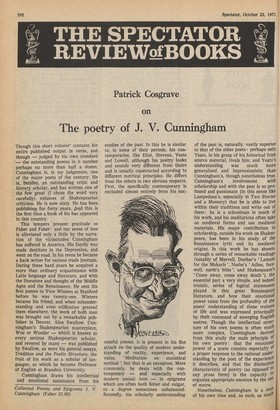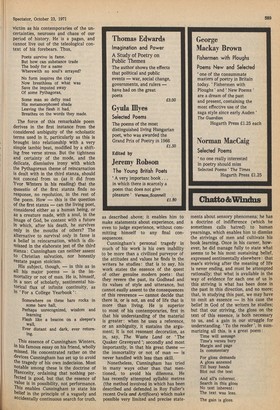THE SPECTATOR REVIEW4BOOKS
Patrick Cosgrave on
The poetry of J. V. Cunningham
Though this short volume* contains his entire published output in verse, and though — judged by his own standard — the outstanding poems in it number perhaps no more than half a dozen, Cunningham is, in my judgement, one of the major poets of the century. He is, besides, an outstanding critic and literary scholar, and has written one of the few great (I chose the word very carefully) volumes of Shakespearian criticism. He is now sixty. He has been publishing for forty years. And this is the first time a book of his has appeared in this country.
This tempers present gratitude to Faber and Faber : and our sense of loss Is alleviated only a little by the narra tion of the vicissitudes Cunningham has suffered in America. His family was made destitute in the Depression, and went on the road. In his teens he became a hack writer for various trade journals.
During these hard years he acquired a more than ordinary acquaintance with Latin language and literature, and with the literature and thought of the Middle Ages and the Renaissance. He sent his first poems to Yvor Winters at Stanford before he was twenty-one. Winters became his friend, and when misunderstanding and even vilification greeted them elsewhere, the work of both men was brought out by a remarkable publisher in Denver, Alan Swallow. Cun ningham's Shakespearian masterpiece, Woe or Wonder — which is known to every serious Shakespearian scholar, and revered by many — was published by Swallow, as were his general essays, Tradition and the Poetic Structure, the fruit of his work as a scholar of languages, as which he became Professor of English at Brandeis University. Cunningham draws his intellectual and emotional sustenance from his Collected Poems and Epigrams J. V. Cunningham (Faber £1.80) studies of the past. In this he is similar, to, in some of their periods, his contemporaries, like Eliot, Stevens, Yeats and Lowell, although his poetry looks and sounds very different from theirs and is usually constructed according to different metrical principles. He differs from the others in two obvious respects. First, the specifically contemporary is excluded almost entirely from his suc cessful poems. It is present in his fine attack on the quality of modern understanding of reality, experience, and value, ' Meditation on statistical method '; but that is an exception. More commonly, he deals with the contemporary — and especially with modern sexual love — in epigrams which are often both bitter and vulgar, to a degree sometimes unbalanced. Secondly, his scholarly understanding of the past is, naturally, vastly superior to that of the other poets : perhaps only Yeats, in his grasp of his historical Irish source material, rivals him; and Yeats's understanding was . much more generalised and impressionistic than Cunningham's, though nonetheless true. Cunningham's involvement with scholarship and with the past is so profound and passionate (in this senge like Lampedusa's, especially 'in Two Stories and a Memory) that he is able to live within their traditions and write out of them : he is a schoolman in much of his work, and his meditations often take on medieval forms and use medieval materials. His major contribution ' to scholarship, outside his work on Shakespeare, has been in his study of the Renaissance lyric and its medieval origins. In this work he has shown, through a series of remarkable readings (notably of Marvell, Dunbar's Lament for the Makaris Nashe's 'Adieu, farewell, earth's bliss ', and Shakespeare's Come away, come away death '), the essential part a very simple, and indeed truistic, series of logical statements played in this great Renaissance literature, and how their emotional power came from the profundity of the poets' understanding of these truisms of life and was expressed principallY by their command of emerging English metres. Though the intellectual struc" ture of his own poems is often much more complex, Cunningham derived from this study the main principle of, his own poetry : that the emotional power of a poem consists especially of a proper response to the rational under standing by the poet of the experience it describes, and that the distinctive characteristic of poetry (as opposed te any prose form) is the capacity t° organize appropriate emotion by the use of metre.
Nonetheless, Cunningham is a of his own time and, as such, as Irmo'
victim as his contemporaries of the uncertainties, neuroses and chaos of our period of history. He is a pagan, and cannot live out of the teleological context of his forebears. Thus, Poets survive in fame.
But how can substance trade The body for a name Wherewith no soul's arrayed?
No form inspires the clay Now breathless of what was Save the imputed sway Of some Pythagoras, Some man so defty mad His metamorphosed shade Leaving the flesh it had, Breathes on the words they made.
The force of this remarkable poem derives in the first instance from the considered ambiguity of the scholastic terms used in it, particularly as this is brought into relationship with a very simple iambic beat, modified by a shifting free verse stress. But the tightness and certainty of the mode, and the delicate, dismissive irony with which the Pythagorean theme of reincarnation is dealt with in the third stanza, should not conceal from us (as it did from Yvor Winters in his reading) that the quaestio of the first stanza finds no response, no resolution, in the rest of the poem. How — this is the question of the first stanza — can the living poet, considered either as a human being, or as a creature made, with a soul, in the image of God, be content with a future in which, after his death, he survives only in the mouths of others? The alternative to survival only in fame is a belief in reincarnation, which is dismissed in the elaborate jest of the third stanza : Cunningham can neither assent to Christian salvation, nor honestly restate pagan stoicism.
His subject, though, — in this as in all his major poems — is the immortality or not of man. He is, himself, In a sort of scholarly, sentimental historical flux of infinite continuity, as in 'For a College Yearbook ' : Somewhere on these bare rocks in some bare hall, Perhaps unrecognized, wisdom and learning Flash like a beacon on a sleeper's wall, Ever distant and dark, ever returning.
This essence of Cunningham Winters, m his famous essay on his friend, wholly missed. He concentrated rather on the devices Cunningham has set up to avoid the tragedy of his own indecision. Most notable among these is the doctrine of Haecceity, ordaining that nothing perfected is good, but that the essence of value is in possibility, not performance. This enables Cunningham to state his belief in the principle of a vaguely and accidentally continuous search for truth, as described above; it enables him to make statements about experience, and even to judge experience, without committing himself to any final consequences.
Cunningham's personal tragedy in much of his work is his own inability to be more than a civilized purveyor of the attitudes and values he finds in the writers he studies : that is to say, his work states the essence of the quest of other genuine modern poets : that they revere the past, its Godhead and its values of style and utterance, but cannot easily assent to the consequences of this reverence — cannot decide that there is, or is not, an end of life that is more than living. He is superior to most of his contemporaries, first in that his understanding of the material is greater : when he uses a reference, or an ambiguity, it sustains the argument; it is not resonant decoration, as in, say, The Waste Land or 'The Quaker Graveyard '; secondly and most importantly, in that his great theme — the immortality or not of man — is never handled with less than skill.
Nonetheless, Cunningham has tried in many ways other than that mentioned, to avoid his dilemma. He has recently attempted syllabic metres (the method involved in which has been described and defended in Roy Fuller's recent Owls and Artificers) which make possible very limited and precise state ments about sensory phenomena; he has a doctrine of indifference (which he sometimes calls hatred) to human yearnings, which enables him to dismiss the strivings of men and cultivate his book learning. Once in his career, however, he did manage fully to state what seems to be his most sustaining belief, expressed sentimentally elsewhere : that man's striving after the meaning of life is never ending, and must be attempted rationally; that what is available in the way of evidence for each one of us in this striving is what has been done in the past in this direction, and no more; that, in studying this past, we may have to omit an essence — in his case the belief in God of the writers he studies; but that our striving, the gloss on the text of this essence, is both necessary to us, and a gain in our struggle for understanding. 'To the reader ', in summarizing all this. is a great poem : Time will assuage.
Time's verses bury Margin and page In commentary For gloss demands A gloss annexed Till busy hands Blot out the text And all's coherent. Search in this gloss No text inherent: The text was loss.
The gain is gloss.



































 Previous page
Previous page